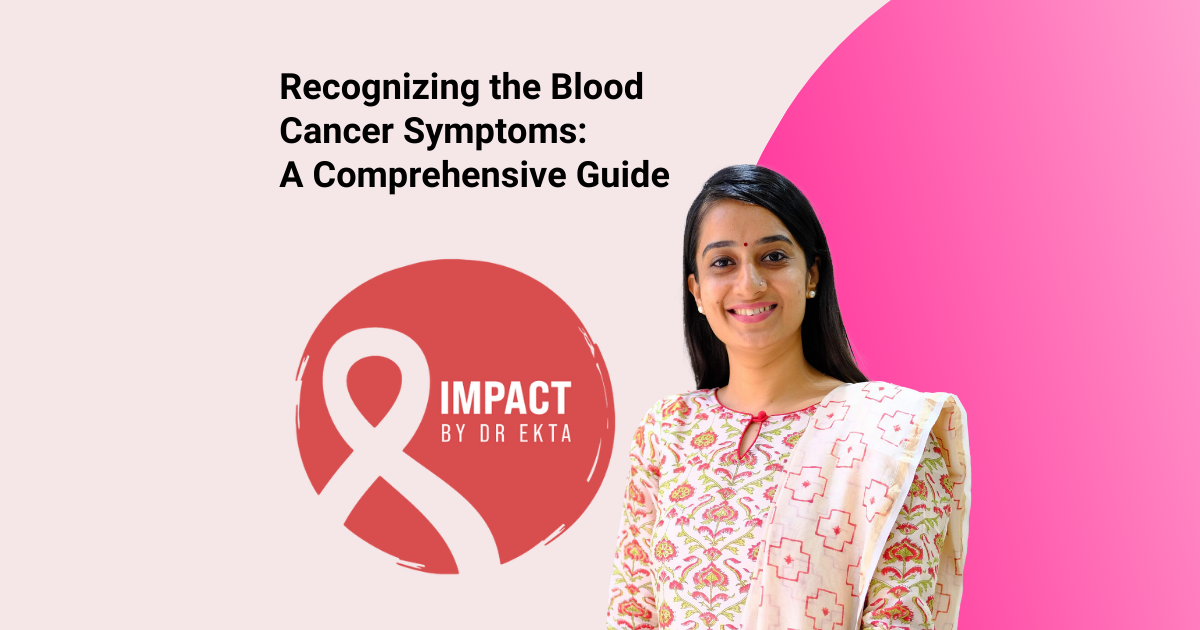Introduction:
Before understanding Blood cancer symptoms, let’s see what blood cancer is all about, encompassing leukemia, lymphoma, and myeloma, which presents a formidable challenge in the realm of oncology. As an oncophysician deeply immersed in the complexities of hematologic malignancies, I am acutely aware of the pivotal role early symptom recognition plays in the prognosis and treatment of these diseases. In this exhaustive guide, I aim to equip readers with the knowledge necessary to identify potential warning signs of blood cancer symptoms, emphasizing the critical importance of proactive healthcare-seeking behaviors.
Understanding Blood Cancer & Blood cancer symptoms:
At the core of understanding blood cancer lies an appreciation of its multifaceted nature. Blood cancers originate from the abnormal proliferation of blood cells, disrupting the intricate balance of hematopoiesis—the process by which blood cells are produced. Leukemia arises from abnormal white blood cells, lymphoma from lymphocytes, and myeloma from plasma cells. Each subtype exhibits unique characteristics, necessitating tailored approaches to diagnosis and treatment.
Common Blood Cancer Symptoms:
Recognizing the blood cancer symptoms is paramount for early detection and intervention. Here are ten common symptoms that may signal the presence of blood cancer:
Unexplained Fatigue: Persistent and unexplained fatigue, often debilitating, may indicate an underlying hematologic malignancy. This fatigue stems from the body’s increased metabolic demand in combating abnormal blood cell proliferation.
Easy Bruising and Bleeding: Individuals with blood cancer may experience easy bruising, bleeding gums, or frequent nosebleeds due to compromised clotting abilities resulting from abnormal blood cell counts.
Unexplained Weight Loss: Sudden and unexplained weight loss, without changes in diet or exercise, maybe a harbinger of blood cancer. Metabolic disruptions associated with the disease can lead to unintended weight loss.
Swollen Lymph Nodes: Enlarged lymph nodes, particularly in the neck, armpits, or groin, may signal lymphoma, a type of blood cancer affecting the lymphatic system.
Recurrent Infections: Blood cancers weaken the immune system, making individuals more susceptible to infections. Persistent or severe infections warrant medical evaluation.
Bone Pain: Blood cancer can cause bone pain, especially in the long bones of the arms and legs. This pain may be persistent and worsen at night, interfering with daily activities.
Shortness of Breath: Anemia resulting from blood cancer can lead to reduced oxygen transport, resulting in shortness of breath even with mild exertion.
Night Sweats and Fever: Persistent night sweats and unexplained fever may be indicative of blood cancer, particularly lymphoma. These symptoms may disrupt sleep patterns and affect overall well-being.
Abdominal Discomfort: Enlarged spleen or liver, often manifested as abdominal fullness or discomfort, can occur in some cases of blood cancer, such as leukemia and lymphoma.
Neurological Symptoms: Blood cancer can sometimes affect the central nervous system, leading to symptoms like headaches, seizures, confusion, or vision changes.
When to Seek Medical Attention:
Prompt medical evaluation is crucial upon experiencing persistent symptoms or noticing unusual health changes. Early detection significantly improves treatment outcomes and quality of life for individuals affected by blood cancer. If any of the aforementioned symptoms persist or worsen, it is imperative to consult a healthcare professional promptly.
Conclusion:
In conclusion, recognizing blood cancer symptoms is pivotal for timely diagnosis and intervention. By familiarizing oneself with the common signs associated with these malignancies, individuals can take proactive steps toward seeking medical attention when needed. As an oncophysician, I urge readers to prioritize their health, remain vigilant, and advocate for themselves in their healthcare journey. By doing so, we can collectively strive towards improved outcomes and better management of blood cancers.
Through increased awareness and proactive healthcare-seeking behaviors, we empower ourselves and our communities to confront blood cancer head-on. If you or someone you know experiences concerning symptoms, do not hesitate to reach out for professional evaluation and support. Early detection saves lives, and together, we can make a difference in the fight against blood cancer.

